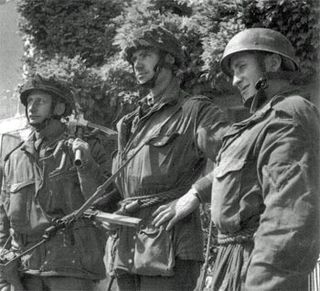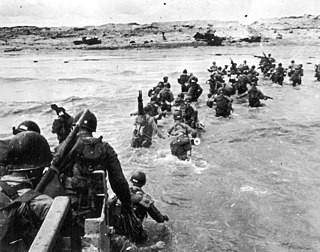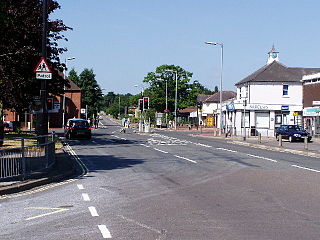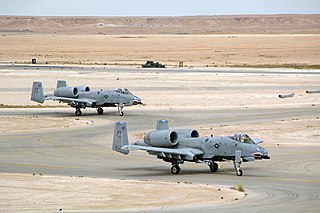Related Research Articles

The Western Allies of World War II launched the largest amphibious invasion in history when they attacked German positions at Normandy, located on the northern coast of France, on 6 June 1944. The invaders were able to establish a beachhead as part of Operation Overlord after a successful "D-Day", the first day of the invasion.

Zoning is the process of dividing land in a municipality into zones in which certain land uses are permitted or prohibited. In addition, the sizes, bulk, and placement of buildings may be regulated. Zoning is the most common regulatory divider local governments use to help carry out urban plans. The type of zone determines whether planning permission for a given development is granted. Zoning may specify a variety of outright and conditional uses of land. It may also indicate the size and dimensions of land area as well as the form and scale of buildings. These guidelines are set in order to guide urban growth and development.

The Normandy landings were the landing operations on Tuesday, 6 June 1944 of the Allied invasion of Normandy in Operation Overlord during World War II. Codenamed Operation Neptune and often referred to as D-Day, it was the largest seaborne invasion in history. The operation began the liberation of German-occupied France and laid the foundations of the Allied victory on the Western Front.

The Berlin Air Safety Centre (BASC) was established by the Allied Control Authority Coordinating Committee on 12 December 1945. Operations began in February 1946 under quadripartite flight rules Paragraph 4. Paragraph 4 of the rules begins: "The Berlin Air Safety Centre has been established in the Allied Control Authority Building with the object of ensuring safety of flights for all aircraft in the Berlin area. BASC regulates all flying in the Berlin control zone and also in the corridors extending from Berlin to the boundaries of adjacent control zones."

The 6th Airborne Division was an airborne infantry division of the British Army during the Second World War. Despite its name, the 6th was actually the second of two airborne divisions raised by the British Army during the war, the other being the 1st Airborne Division. The 6th Airborne Division was formed in the Second World War, in mid-1943, and was commanded by Major-General Richard N. Gale. The division consisted of the 3rd and 5th Parachute Brigades along with the 6th Airlanding Brigade and supporting units.

In the United States, freedom of speech and expression is strongly protected from government restrictions by the First Amendment to the United States Constitution, many state constitutions, and state and federal laws. The Supreme Court of the United States has recognized several categories of speech that are given lesser or no protection by the First Amendment and has recognized that governments may enact reasonable time, place, or manner restrictions on speech. The First Amendment's constitutional right of free speech, which is applicable to state and local governments under the incorporation doctrine, only prevents government restrictions on speech, not restrictions imposed by private individuals or businesses unless they are acting on behalf of the government. However, laws may restrict the ability of private businesses and individuals from restricting the speech of others, such as employment laws that restrict employers' ability to prevent employees from disclosing their salary with coworkers or attempting to organize a labor union.

Utah, commonly known as Utah Beach, was the code name for one of the five sectors of the Allied invasion of German-occupied France in the Normandy landings on June 6, 1944 (D-Day), during World War II. The westernmost of the five code-named landing beaches in Normandy, Utah is on the Cotentin Peninsula, west of the mouths of the Douve and Vire rivers. Amphibious landings at Utah were undertaken by United States Army troops, with sea transport, mine sweeping, and a naval bombardment force provided by the United States Navy and Coast Guard as well as elements from the British, Dutch and other Allied navies.

The Reichsmark was the currency in Germany from 1924 until 20 June 1948 in West Germany, where it was replaced with the Deutsche Mark, and until 23 June in East Germany when it was replaced by the East German mark. The Reichsmark was subdivided into 100 Reichspfennig. The Mark is an ancient Germanic weight measure, traditionally a half pound, later used for several coins; whereas Reich, that is realm in English, comes from the official name for the German nation state from 1871 to 1945, Deutsches Reich.
Freedom of movement, mobility rights, or the right to travel is a human rights concept encompassing the right of individuals to travel from place to place within the territory of a country, and to leave the country and return to it. The right includes not only visiting places, but changing the place where the individual resides or works.

Hedge End is a town and civil parish in Hampshire, England. Situated to the east of the City of Southampton, it adjoins the districts of West End and Botley. Hedge End lies within the Borough of Eastleigh and is part of the Southampton Urban Area. The original hamlet developed on Botley Common after 1250 when it was granted to the men of Botley as common pasture. In 1267, royal charters allowed Botley to hold an annual fair and a weekly market on the common which eventually became a market town.

Road signs in the United Kingdom conform broadly to European design norms, though a number of signs are unique: direction signs omit European route numbers and road signs generally use the Imperial System of units, unlike the rest of Europe.

Operation Titanic was a series of military deceptions carried out by the Allied Nations during the Second World War. The operation formed part of Operation Bodyguard, the cover plan for the Normandy landings in 1944. Titanic was carried out on 5–6 June 1944 by the Royal Air Force and the Special Air Service. The objective of the operation was to drop 500 dummy parachutists in places other than the real Normandy drop zones, to deceive the German defenders into believing that a large force had landed, drawing their troops away from the beachheads and strategic sites such as Caen.

A parking violation is the act of parking a motor vehicle in a restricted place or for parking in an unauthorized manner. It is against the law virtually everywhere to park a vehicle in the middle of a highway or road; parking on one or both sides of a road, however, is commonly permitted. However, restrictions apply to such parking, and may result in an offense being committed. Such offenses are usually cited by a police officer or other government official in the form of a traffic ticket.

Operation Overlord was the codename for the Battle of Normandy, the Allied operation that launched the successful invasion of German-occupied Western Europe during World War II. The operation was launched on 6 June 1944 with the Normandy landings. A 1,200-plane airborne assault preceded an amphibious assault involving more than 5,000 vessels. Nearly 160,000 troops crossed the English Channel on 6 June, and more than two million Allied troops were in France by the end of August.
No 297 Squadron was a squadron of the Royal Air Force. It was notable for being the first airborne forces squadron formed. With sister No 296 Squadron it formed No 38 Wing RAF in January 1942, joined in August by No 295 Squadron; the Wing expanded in 1943 to become No 38 Group RAF. The squadron saw action in Sicily and took part in the D-Day invasion and Operation Market Garden. It was disbanded in 1950.

The 1st Canadian Parachute Battalion was an airborne infantry battalion of the Canadian Army formed in July 1942 during the Second World War; it served in North West Europe, Landing in Normandy during Operation Tonga, in conjunction with the D-Day landings of 6 June 1944 and in the airborne assault crossing of the River Rhine, Operation Varsity, in March 1945. After the end of hostilities in Europe, the battalion was returned to Canada where it was disbanded on 30 September 1945.
The road signs of the Netherlands are regulated in the Reglement verkeersregels en verkeerstekens 1990, commonly abbreviated as RVV 1990.

The United States Air Force's 438th Air Expeditionary Advisory Group is a provisional unit assigned to United States Air Forces Central to activate or inactivate as needed. It was last active in Al Anbar province, Iraq to provide close-air support to coalition forces in the region with Fairchild Republic A-10 Thunderbolt II aircraft. It was composed of deployed aircraft, equipment and personnel from Air Force units around the world.
Operation Peppermint was the codename given during World War II to preparations by the Manhattan Project and the European Theater of Operations United States Army (ETOUSA) to counter the danger that the Germans might disrupt the June 1944 Normandy landings with radioactive poisons.
A Controlled Parking Zone or CPZ is a specific type of UK parking restriction that may be applied to a group of roads within the zone. The intended purpose of a CPZ is to reduce the clutter that can arise from erecting several signs that would otherwise convey the same information, such as a common time restriction sign adjacent to all the single yellow lines in the zone. A sign indicating the start of a CPZ typically states that there are parking, loading, weight or other restrictions between certain hours of operation.
References
| This World War II article is a stub. You can help Wikipedia by expanding it. |